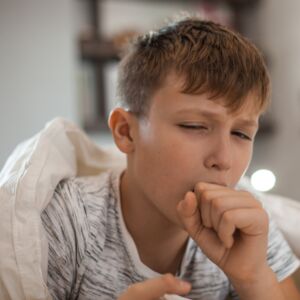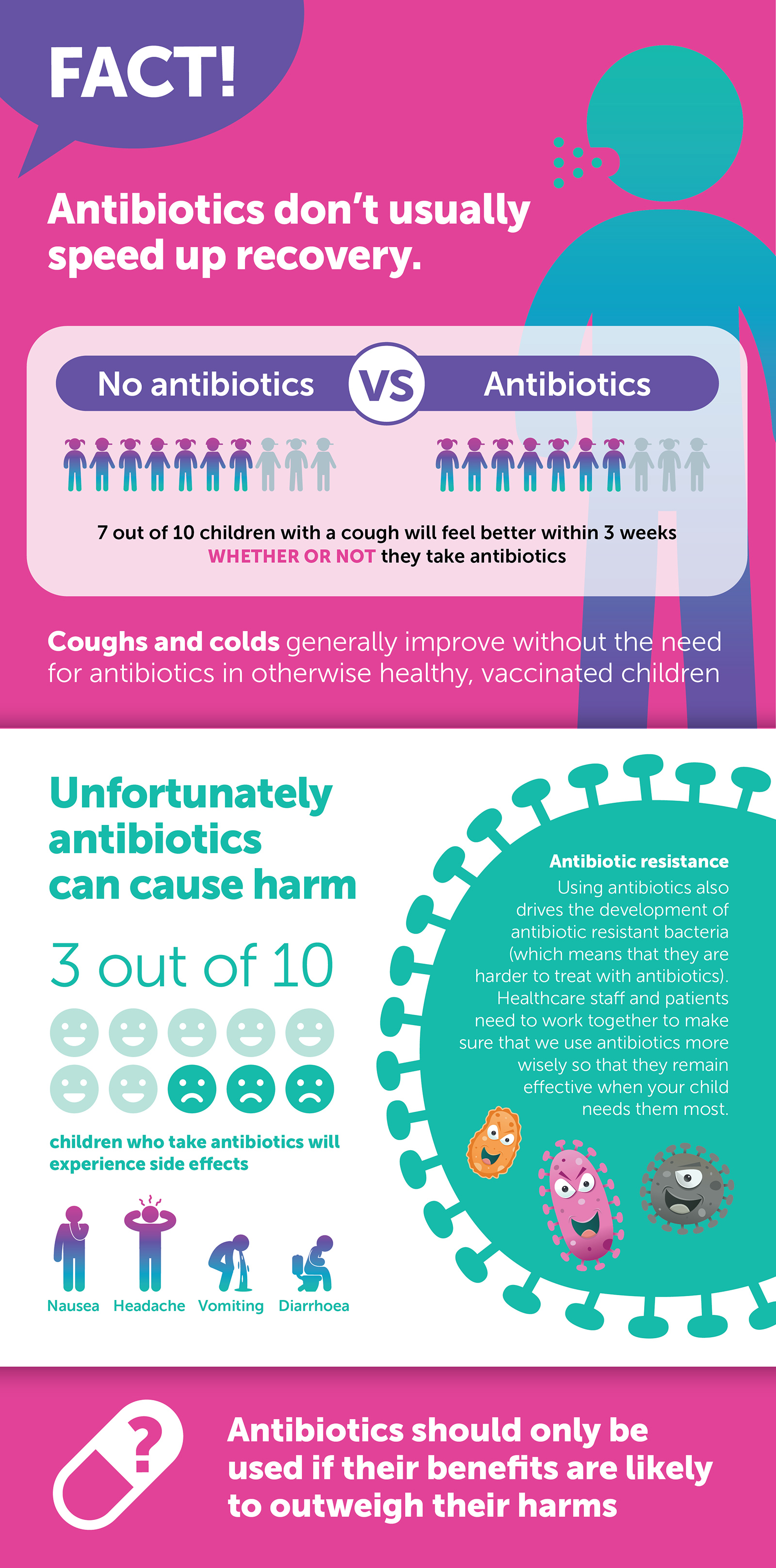If you are unsure about the advice given below, please contact 111 or your GP for futher assistance.
Cough and cold
Coughs and colds are extremely common in young children. Over the first year of life, your child is likely to have up to 8 of these episodes.
- Coughing is the body's natural way of clearing infection.
- Most of these are likely to be caused by a virus, which means that antibiotics are of no benefit (and may actually result in side effects such as rash and diarrhoea, as well as increasing the risk of them developing antibiotic resistance).

Helping your child with Coughs and Colds
Other symptoms to look out for:
- Having green snot or a noisy chest does not mean that your child has an infection requiring antibiotics.
- It can sometimes be harder to identify the cause of a cough. In general, if it is associated with a runny nose, red eyes, ear pain or a wheeze, it is far more likely to be viral. Noisy chests are also common in young children with viral infections.
- Coughing can wake a child in the night but does not mean the illness is more severe.
- Children requiring antibiotics usually appear more unwell, with difficulty breathing, drowsiness, cold hands and feet and possibly blue lips - seek urgent medical attention if any of these features are present.
When should you worry?
If your child has any of the following:
- Is going blue around the lips
- Has pauses in their breathing (apnoeas) or has an irregular breathing pattern or starts grunting
- A harsh breath noise as they breathe in (stridor) present all of the time (even when they are not upset)
- Too breathless to feed (eat or drink) or talk/make noise
- Becomes pale, mottled and feels abnormally cold to touch
- Becomes extremely agitated (crying inconsolably despite distraction), confused or very lethargic (difficult to wake)
- Develops a rash that does not disappear with pressure (the ‘Glass Test’)
- Is under 3 month of age with a temperature of 38°C / 100.4°F or above
- Has laboured/ rapid breathing or they are working hard to breathe - drawing the muscles below their lower ribs, at their neck or between their ribs (recession).
You need urgent help.
Go to the nearest Hospital Emergency (A&E) Department or phone 999
If your child has any of the following:
- A harsh breath noise as they breathe in (stridor) present only when they are upset.
- Seems dehydrated (sunken eyes, drowsy or passed no urine for 12 hours)
- Is becoming drowsy (excessively sleepy) or irritable (unable to settle them with toys, TV, food or picking up) – especially if they remain drowsy or irritable despite their fever coming down
- Has extreme shivering or complains of muscle pain
- 3-6 months of age with a temperature of 39°C / 102.2°F or above (but fever is common in babies up to 2 days after they receive vaccinations)
- Continues to have a fever of 38.0°C or above for more than 5 days
- Is getting worse or if you are worried
You need to contact a doctor or nurse today.
Please ring your GP surgery or call NHS 111 - dial 111
If none of the above features are present
Additional advice is also available to young families for coping with crying of well babies – click here.
Self care
Continue providing your child’s care at home. If you are still concerned about your child, call NHS 111 – dial 111
What should you do?
- Keep your child well hydrated by offering them lots of fluids.
- Most children with coughs/colds do not require treatment with antibiotics. Antibiotics rarely speed up recovery and often cause side effects such as rash and diarrhoea. They will also promote the development of antibiotic resistant bacteria in your child.
- Try children's paracetamol and/or ibuprofen - cough syrup does not tend to help with coughs.
- Try using saline nose drops or spray if your baby has a blocked nose.
- For children over 1 year, a spoon of honey (perhaps in a warm drink) half an hour before bed may help them to wake less often in the night.
- For children over 2 years, vapour rubs (containing camphor, menthol and/or eucalyptus) may help children sleep better.

How long will your child's symptoms last?
- Unfortunately, coughs and colds can continue for weeks before they get better. In addition, over the winter, children are likely to get one viral infection after another, which can make you think that they are never well. Things will get better in the summer months!
- Having a cough for 2 or 3 weeks does not mean that your child needs antibiotics.
- Children under 2 years of age with breathing difficulty may have bronchiolitis. This is an extremely common condition that usually starts as a runny nose and cough but their breathing may get worse over the next 2-3 days.
- If your child is struggling to breathe, they need to be urgently seen by a medical practitioner and are likely to need treatment. If your child has croup (hoarse voice, barking cough, noisy breathing), they will also need to be seen by a medical practitioner.
Where should you seek help?
- If it is non-urgent, speak to your local pharmacist or health visitor.
- If your child has any of the above features, urgently see your GP. For an urgent out-of-hours GP appointment, call NHS 111.
- You should only call 999 or go your nearest A&E department in critical or life threatening situations.
For wear and tear, minor trips and everything in between.
Self-care
You can treat your child's very minor illnesses and injuries at home.
Some illnesses can be treated in your own home with support and advice from the services listed when required, using the recommended medicines and getting plenty of rest.
Sound advice
Children can recover from illness quickly but also can become more poorly quickly; it is important to seek further advice if a child's condition gets worse.
For information on common childhood illnesses go to What is wrong with my child?
Pharmacists are experts in many aspects of healthcare and can offer advice on a wide range of long-term conditions and common illnesses such as coughs, colds and stomach upsets. You don’t need an appointment and many have private consultation areas, so they are a good first port of call. Your pharmacist will say if you need further medical attention.
Sound advice
- Visit a pharmacy if your child is ill, but does not need to see a GP.
- Remember that if your child's condition gets worse, you should seek further medical advice immediately.
- Help your child to understand - watch this video with them about going to the pharmacy.
For information on common childhood illnesses go to What is wrong with my child?
Health visitors are nurses or midwives who are passionate about promoting healthy lifestyles and preventing illness through the delivery of the Healthy Child Programme. They work with you through your pregnancy up until your child is ready to start school.
Health Visitors can also make referrals for you to other health professionals for example hearing or vision concerns or to the Community Paediatricians or to the child and adolescent mental health services.
Contact them by phoning your Health Visitor Team or local Children’s Centre.
Sound advice
Health visitors also provide advice, support and guidance in caring for your child, including:
- Breastfeeding, weaning and healthy eating
- Exercise, hygiene and safety
- Your child’s growth and development
- Emotional health and wellbeing, including postnatal depression
- Safety in the home
- Stopping smoking
- Contraception and sexual health
- Sleep and behaviour management (including temper tantrums!)
- Toilet training
- Minor illnesses
For more information watch the video: What does a health visitor do?
School nurses care for children and young people, aged 5-19, and their families, to ensure their health needs are supported within their school and community. They work closely with education staff and other agencies to support parents, carers and the children and young people, with physical and/or emotional health needs.
Primary and secondary schools have an allocated school nurse – telephone your child’s school to ask for the contact details of your named school nurse.
There is also a specialist nurse who works with families who choose to educate their children at home.
Sound Advice
Before your child starts school your health visitor will meet with the school nursing team to transfer their care to the school nursing service. The school nursing team consists of a school nursing lead, specialist public health practitioners and school health staff nurses.
They all have a role in preventing disease and promoting health and wellbeing, by:-
- encouraging healthier lifestyles
- offering immunisations
- giving information, advice and support to children, young people and their families
- supporting children with complex health needs
Each member of the team has links with many other professionals who also work with children including community paediatricians, child and adolescent mental health teams, health visitors and speech and language therapists. The school health nursing service also forms part of the multi-agency services for children, young people and families where there are child protection or safeguarding issues.
GPs assess, treat and manage a whole range of health problems. They also provide health education, give vaccinations and carry out simple surgical procedures. Your GP will arrange a referral to a hospital specialist should you need it.
Sound advice
You have a choice of service:
- Doctors/GPs can treat many illnesses that do not warrant a visit to A&E.
- Help your child to understand – watch this video with them about visiting the GP or going to a walk in centre
For information on common childhood illnesses go to What is wrong with my child?
If you’re not sure which NHS service you need, call 111. An adviser will ask you questions to assess your symptoms and then give you the advice you need, or direct you straightaway to the best service for you in your area.
Sound advice
Use NHS 111 if you are unsure what to do next, have any questions about a condition or treatment or require information about local health services.
For information on common childhood illnesses go to What is wrong with my child?
A&E departments provide vital care for life-threatening emergencies, such as loss of consciousness, suspected heart attacks, breathing difficulties, or severe bleeding that cannot be stopped. If you’re not sure it’s an emergency, call 111 for advice.


